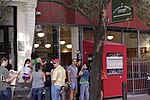Nuyorican Poets Café
20th-century American literatureAlphabet City, ManhattanCultural history of New York CityEast Village, ManhattanHispanic and Latino American culture in New York City ... and 7 more
Hispanic and Latino organizationsLatin American literatureNightclubs in ManhattanPerformance art in New York CityPoetry organizationsPuerto Rican culture in New York CitySlam poetry

The Nuyorican (Puerto Rican New Yorkers) Poets Cafe is a nonprofit organization in Alphabet City, on the Lower East Side of Manhattan. It is a bastion of the Nuyorican art movement in New York City, and has become a forum for poetry, music, hip hop, video, visual arts, comedy, and theater. Several events during the PEN World Voices festival are hosted at the cafe.The Café is meant to be a shooting-off point from which Nuyorican artists, poets, and playwrights take shared themes and messages of community, understanding, and the breaking down of arbitrary separators of color, among others, and spread them outside the environment of the Café.
Excerpt from the Wikipedia article Nuyorican Poets Café (License: CC BY-SA 3.0, Authors, Images).Nuyorican Poets Café
Avenue C, New York Manhattan
Geographical coordinates (GPS) Address Nearby Places Show on map
Geographical coordinates (GPS)
| Latitude | Longitude |
|---|---|
| N 40.721951 ° | E -73.9817816 ° |
Address
Avenue C 91
10009 New York, Manhattan
New York, United States
Open on Google Maps






